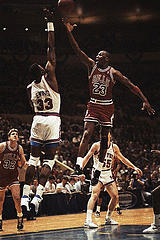1.3 Paco likes tennis
 |
| By LEOL30. C. Commons |
At this point, you should already have noticed that the third person singular (singular nouns, he, she, it, and one) of the Present Simple Tense adds the ending -s or -es. Do you remember? Paco likes tennis, Juan sometimes tells jokes, or Claudia likes films based on novels or reality.
Most verbs just add -s to the bare infinitive (e.g. He works hard, She loves reading, Paco likes sports a lot). However, not all third person singulars are formed just by adding -s. So, click here to know which verbs have different spelling rules when adding -s to form the third person singular in the Present Simple.
Remember that the third person singular of modal verbs such as may, can, should, would, will, or shall NEVER take the ending -s (e.g. He can read Chinese books, My father may be at home now, Paco will help you if you want to). Some verbs have their own third person singular (e.g. to be: he is, she is, it is; to have: he has, she has, it has).
As you know, Paco likes sports and he loves watching basketball and tennis on TV. He sometimes meets Andrés and they watch tennis matches together. One of Andrés's favourite tennis players is Roger Federer. However, as most Spaniards, Andrés and he are keen on Rafael Nadal. Do you like tennis? If you do, have a look at Andrés and Paco's favourite play and pay attention to the commentator's words!
Which of these two sentences is in the third person singular?
- Roger Federer and Lleyton Hewitt fight out one of the classic rallies of the modern era.
- The play of the week requires no commentary.
|
My uncle and aunt is keen on Roger Federer, too.
| |
|
My mother-in-law usually watches tennis on TV.
| |
|
Paco's father often play tennis with Paco at weekends.
|
|
Our classmates usually gets up early to go to school.
| |
|
Tennis and basketball is Paco's favourite sports.
| |
|
Sofia never practises sports with her brother, only Paco's father does.
|
As we have seen in a previous video, sometimes we forget to add the -s ending to the third person singular in the Present Simple Tense. Thus, if you don't want to make this common mistake, you must get used to it.
- Improve it by clicking here.
Read what Paco's sister, Sonia, says:
I am Paco's sister. I have lots of interests. I am really interested in my studies and in keeping an excellent relationship with both my relatives and friends. At the moment, I live with my parents, but I really hope I can get my own house soon. Like my brother, I love travelling and going out with my friends, but what I like best is practising sports. However, unlike him, my favourite sports are not tennis and basketball, I prefer to go jogging. I always have an excellent time jogging in the park. My friend Elisa frequently comes with me. I try not to go jogging alone, since I get really bored if nobody accompanies me.
Rewrite Paco's words in the third person singular (pay attention to the changes in the pronouns):
Sonia is Paco's...

|
| By LEOL30. C. Commons |
The development of English throughout history has been characterized by a tendency to uniformity. So, in the Middle English period (1100-1550) there were great changes in the English language. Among them, we can mention that there was a reduction of inflections (endings) that affected nouns, adjectives, pronouns, and verbs. In fact, the only inflection that survived was the third person singular -s (in Old English [450-1100] it was -eth, e.g. sing-singeth). However, it is thought that the third person singular -s in Modern English (1550-) is not a phonetic development of -eth, but due to a Northern influence.
